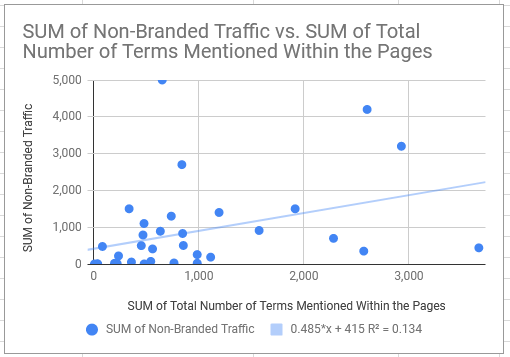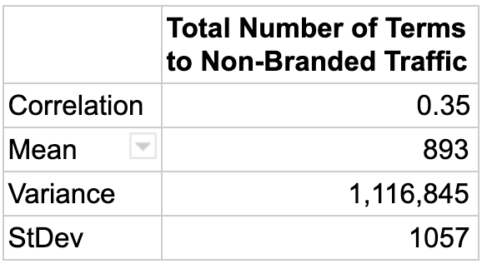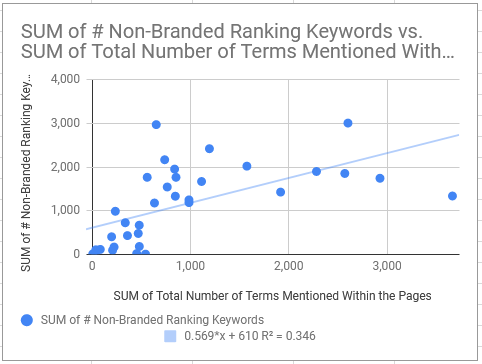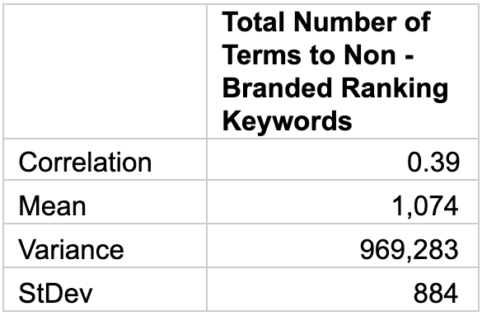Pharma Content Marketing – Do Keywords Count?
Natural Language Processing (NLP) combined with Artificial Intelligence (AI) has helped Google provide the best results to people using their search platform. By understanding a person’s true intent, Google uses its highly advanced algorithms to look at content across the internet and find the most useful and relevant items.
MarketMuse conducted an analysis of the relationship between un-branded keyword usage on over 86 diabetes branded websites. We wanted to know:
Is there a correlation between non-branded keyword usage on websites and search rankings on Google?
Pharma Content Marketing Keyword Study
There are four steps to conducting this study on keyword usage and its correlation with traffic and ranking.
- Create a topic model.
- Identify a list of appropriate sites.
- Determine how frequently these terms are mentioned on each site.
- Determine the amount of non-branded traffic each site received.
Creating a Topic Model
We began with a list of 58 keywords related to Diabetes Type 2, such as “hemoglobin A1c”, and “blood sugar.” Using proprietary technology, MarketMuse built Knowledge Graphs and expanded this list to 308 conceptually-related topics. These are the topics experts will naturally cover when creating content surrounding the Diabetes Type 2 space.
Identifying Websites
Next we identified 35 website domains that market diabetes products, like Sanofi’s lantus.com and Salix’s cycloset.com. For this study we excluded SEO competitors like Mayo Clinic and WebMD. These sites address a wide range of health issues and are not focused on Diabetes Type 2, unlike the product sites.
Determining Frequency of Term Mentions
Now we needed to identify how frequently the terms in our Knowledge Graphs were used on these sites. So, MarketMuse analyzed every page on each domain, counting how often the 308 related topics were mentioned on each page. The total number of mentions were then summed for each domain to generate an overall MarketMuse Domain Score.
As expected, sites with few pages scored lower than those with much greater amounts of content. More pages afford the opportunity to include those topics in the course of discussion.
Determining Non-branded Traffic
Finally we needed to determine how much non-branded traffic each site received. We removed branded traffic from the equation as it is unique to each site. Obviously, every site will rank best for its own brand, so including this traffic offers zero insight.
Here is what we did.
Using SEMRush, a third-party data resource, for each domain, MarketMuse calculated the number of non-branded ranking keywords. Non-branded ranking keywords are defined as the total number of keywords that each domain is ranking for in Google search, minus the number of branded keywords that each domain is ranking for in Google Search (e.g. “lantus”).
Similarly, using SEMRush, MarketMuse calculated the amount of non-branded search traffic for each domain. Non-branded search traffic is defined by the number of visitors to each domain (as estimated through SEMRush data) for non-branded search terms only (e.g. “why is my blood sugar low?”).
Do Keywords Counts? – The Results
The MarketMuse Domain Score was correlated to the amount of non-branded ranking keywords and non-branded search traffic for each domain. Here are the results.
Moderate Correlation between Keyword Usage and Traffic for Organic Search.


Moderate Correlation between on-Site Keyword Usage and the Number of Keywords Rankings in Organic Search.


Last Thoughts
A content-rich site focused on a specific topic will frequently mention related topics throughout its pages. This happens through natural discourse. Evidence suggests that these sites tend to rank for more keywords and receive greater traffic as a result.
But don’t leave this to chance. You can tilt the odds in your favor by purposefully optimizing your content to ensure complete coverage of any chosen topic.
Stephen leads the content strategy blog for MarketMuse, an AI-powered Content Intelligence and Strategy Platform. You can connect with him on social or his personal blog.